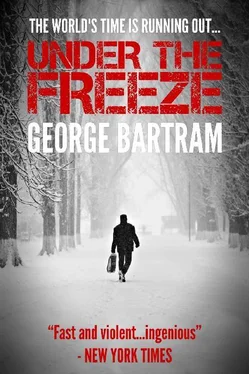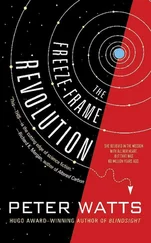There was a stir then at the back of the orchestra and they stopped talking, although Tarp glanced again at the man in the wheelchair and his thugs and found himself wondering if the man with the British medals could be English, and what he was doing there; and then, like Juana, he was craning his neck to see the group coming into the orchestra from the back.
“Who is it?” he asked her.
“Your Russians,” she said. She was standing, unabashed by her own curiosity. A group of twenty people was coming down the wide aisle. Around them some of the audience were applauding politely. A heavy-jowled man came first, with a short, heavy-jowled woman half a step behind him; next came two men, one either drunk or feverish; and next, to Tarp’s surprise and relief, came Repin. With him was a fortyish woman who had that rawboned look that dancers sometimes take on with age; Tarp thought she was the ballet manageress. Repin looked pleased and yet pugnacious, like Khruschev in his old photos.
Tarp stood up.
Repin was on the side away from him, and he was bowing a little this way and that, but he turned to say something to the tall woman with him and he saw Tarp. His face went slack momentarily and he turned rather red, like the man ahead of him. Tarp smiled and bowed.
“What is it?” Juana tugged at his arm.
“An acquaintance.”
“In the ballet?”
“A friend of theirs.”
He smiled at Repin again. The old KGB officer had composed himself and he bowed in return, and his head came back up to jerk toward the door behind him in a way that was impossible to misinterpret. He wanted Tarp to meet him in the lobby.
An overture played and the huge chandeliers dimmed and then the curtain rose on a lush, pretty, Romantic scene. People were still coming in, and Tarp watched for Repin’s stocky body to appear in the aisle.
“Excuse me,” he said to Juana Marino.
“It has just started!”
“I shall come back.”
He found Repin in the shadow of a staircase, at the bottom of a lobby that rose up through the building’s three stories. He seemed to be studying a program with care. When Tarp came up, he looked over the folded paper and said, “I thought you were dead.”
“I need your help.”
“They told me your boat had blown up.”
“The boat did. I need to get out of Cuba.”
“I was betrayed. You believe that, I hope? I did not try to kill you. Other times, yes. This time, why should I?”
“There are easier ways. What went wrong?”
“I made an arrangement with the navy; somebody in DGI finds out, maybe from Moscow. Eh? They do not kill me; that is too obvious; killing you is good idea.”
“Do they know it’s me?”
“Maybe not. They know is an American, obviously.”
“Anything new on the submarine or the plutonium?”
“I have agent here looking at something. He has idea, he thinks. We will see.” Repin pushed out his lips as if he might whistle. He was dressed in great style, not in a Bulgarian tropical disaster but in an expensive English suit, and he looked more than ever like a ruthless capitalist. “I leave Cuba in six days. Not much time.” He tapped the edge of the program on his teeth. “You are with beautiful woman. How does that happen?”
“An accident.”
“There are no accidents.” He tapped the program some more and lifted an eyebrow. “We are being watched by the KGB agent sent to watch the KGB agent who watches the ballet troupe. He is one of Telyegin’s, I think, so he is perhaps all right. Still, it is best I introduce you.” He took Tarp’s arm and turned him around. There was a mousy-looking young man huddled into himself next to a drinking fountain. They walked over. “Eugen Nemirovich, my young friend, I want you to meet one of our staunchest friends in the hemisphere. May I present Señor Picardo.”
Good! Tarp thought. My fifth identity today . The Russian made a little bob of a bow. “ Enchanté ,” Tarp murmured.
“Senor Picardo is an internationalist,” Repin said. He smiled. The KGB man smiled as young men do when the boss says almost anything. “We are all friends of peace,” he said.
“Peace with honor,” Tarp said.
“Indeed, oh, yes, surely.” After some seconds, the young man backed away to another wall, where he stood uncertainly, still watching them. By then they were the only people in the gigantic lobby.
“I’ve got a passport, but it needs a visa and an entry stamp. Can you fix it?” Tarp said.
“Put it inside your program and leave it on the third urinal in the men’s room. I will come in after you and get it.”
“I’ll need a way out of Cuba.”
“I will work on it.” Repin’s face was troubled. “But it is very hard to trust anybody now. This young man who watches us, for example — who does he talk to? Who reads his report besides Telyegin? Bad, very bad. You need a place to hide tonight?”
“That’s all right. I’ll take care of myself.”
“The woman?”
“I’ll take care of myself.”
“Maybe I should hide you. If I could find a place where it would not be handing you over to them to kill.”
“I’ll take care of myself. How do I contact you?”
“There is a promenade along the harbor. A cafe called Angolan Memories. Tomorrow night at seven, all right?”
“All right.” He hesitated. “If you do find out something, you know, they will try to kill you next.”
Repin’s face slackened. “It has been tried before. I cannot prevent it.”
“Your agent here. Is he secure?”
“Who knows?” Repin sighed. “Enjoy the ballet.”
When he slid back into his seat next to her, she took his arm again. Her thigh was very warm against his, and the touch seemed not to bother her at all. Tarp looked at her instead of the ballet. She was taller than most of the women he had seen in Havana, her face angular but full-lipped, high-boned. She was a woman that many men would have made great effort to have. He put his mouth close to her ear and said, “Do you believe in accidents?”
“Shhh,” she said, intent on the ballet.
Tarp stared at the stage and concentrated, instead, on Repin and the plutonium. That Maxudov had a network in Cuba was obvious; it was probably not the regular KGB net — it was silly to think that he would have corrupted a whole section — but was, perhaps, made up of a few well-placed agents and a lot of people who thought they were performing their patriotic duty to Cuba or the U.S.S.R. and were really serving one man. Such a situation did not mean that the plutonium had come to Cuba. Tarp was not convinced by the nuclear freeze posters that covered the walls of Havana, any more than he was convinced that the diplomats who sat above him at the ballet believed in peace; but he would need hard evidence before he would believe that Cuba wanted its own atomic weapons so much that it would deal with a Soviet traitor. No, that was senseless. What was far likelier was that the buyer was a terrorist or the PLO or a consortium of terrorist groups — yet it was hard to see why even they would risk the fury of Moscow.
But if it were they — or somebody like them — who, then, was Maxudov? And why was he willing to take such risk? Not for zeal. Tarp had only marginal belief in zeal. He believed more fully in human weakness — a woman, a man, money, ambition. But how was Maxudov served in any of those ways?
I’m in the wrong place , he thought. Wrong city , wrong country , I need to get to Washington . Ironically, the CIA would know more perhaps about Cuban ambitions toward atomic weaponry than the Soviets did, especially if the Soviets were being diddled by one of their own. Then I need the gossip from Europe . I need to be in London . Paris . He looked down the hall at Repin. Then Moscow . He would have to kill twenty-four hours before he could start. Wrong city , wrong country . He glanced at the woman beside him. Right woman .
Читать дальше












